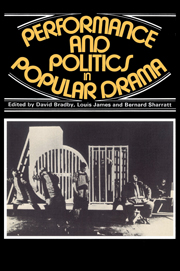 Performance and Politics in Popular Drama
Performance and Politics in Popular Drama Book contents
- Frontmatter
- Contents
- List of contributors
- Preface
- Acknowledgements
- PART ONE Spectacle, performance and audience in nineteenth-century theatre
- Introduction
- Was Jerrold's Black Ey'd Susan more popular than Wordsworth's Lucy?
- Word and image in Pixérécourt's melodramas: the dramaturgy of the strip-cartoon
- Joseph Bouchardy: a melodramatist and his public
- The music of melodrama
- Popular theatre in Victorian Birmingham
- Water drama
- Equestrian drama and the circus
- Theatre of war: the Crimea on the London stage 1854–5
- Popular drama and the mummers' play
- PART TWO Politics and performance in twentieth-century drama and film
- PART THREE Problems and prospects
- Appendix: Tempo, Tempo
- Select bibliography
- General index
- Index of titles of plays, films, sketches
- Index of theatres, theatre companies and groups
Was Jerrold's Black Ey'd Susan more popular than Wordsworth's Lucy?
Published online by Cambridge University Press: 08 March 2010
- Frontmatter
- Contents
- List of contributors
- Preface
- Acknowledgements
- PART ONE Spectacle, performance and audience in nineteenth-century theatre
- Introduction
- Was Jerrold's Black Ey'd Susan more popular than Wordsworth's Lucy?
- Word and image in Pixérécourt's melodramas: the dramaturgy of the strip-cartoon
- Joseph Bouchardy: a melodramatist and his public
- The music of melodrama
- Popular theatre in Victorian Birmingham
- Water drama
- Equestrian drama and the circus
- Theatre of war: the Crimea on the London stage 1854–5
- Popular drama and the mummers' play
- PART TWO Politics and performance in twentieth-century drama and film
- PART THREE Problems and prospects
- Appendix: Tempo, Tempo
- Select bibliography
- General index
- Index of titles of plays, films, sketches
- Index of theatres, theatre companies and groups
Summary
Melodrama, that once ragged waif, has been brought in from the cold. A decade ago, ‘melodramatic’ was a term of critical abuse: now ‘Melodrama’ has its volume in Methuen's ‘Critical Idiom’ series, along with ‘Romanticism’ and ‘The Epic’. She has been washed, given clean clothes, and warmed by academic fires. There are murmurs about aristocratic parentage. Shakespeare? Bernard Shaw wrote that if melodrama was good enough, ‘why, then one has Lear or Macbeth’. Sophocles? Eric Bentley pointed out that the key emotions of melodrama, ‘Pity’ and ‘Fear’, were also those Aristotle prescribed for tragedy. Robert W. Heilman, in Tragedy and Melodrama (Seattle, 1969), argued against melodrama's status as tragedy, but gave it the dignity of academic investigation; in 1976 Peter Brooks in the most penetrating study of the genre to date, The Melodramatic Imagination, applied the concept to Balzac and Henry James. Will Melodrama prove to be the contemporary heroine and Muse? Eisenstein traced the film concept of montage back, through Dickens, to melodrama, and today melodrama dominates cinema and television screens for reasons other than those of Russian cinematic technique.
Or has there been a melodramatic twist to our story? Look again at the now clean and bespectacled young lady with all those new books. Has there been a switch somewhere in the plot? How remote are considerations of ‘the melodramatic imagination’ from the drawled, heavily mannered speech, the acrobatically stylised gestures, the crudely emotional audience reaction at the Surrey or the Britannia melodrama of the 1840s? Is the real Melodrama still out there somewhere in the snow?
- Type
- Chapter
- Information
- Performance and Politics in Popular DramaAspects of Popular Entertainment in Theatre, Film and Television, 1800–1976, pp. 3 - 16Publisher: Cambridge University PressPrint publication year: 1980


